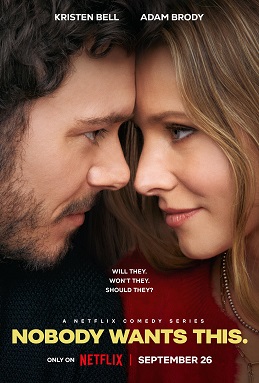
Nobody Wants This Season 2: The Good and The Bad
As a child, my father thought I watched too much television. Little did he know one day I’d have to do it for work! Nobody Wants This, season 2 premiered last Thursday, so I spent the weekend binge watching it. My 30,000 foot impression is that it was generally less tropy than the first season and added a bunch of Jewish teachings and trivia, some which were poignant, but like last season, once again, the ending disappointed me.
Before I get into the details, I want to acknowledge that Erin Foster – co-creator of the show – has used her platform to stand up for Israel and the Jewish people since October 7. Plenty of people born Jewish have chosen not to do this and it’s meaningful that she has.
SPOILERS AHEAD:
We begin season 2 learning some new information that makes the end of season 1 less painful for me. Rabbi Noah was not actually choosing his non-Jewish girlfriend over Judaism. We learn at the start of the second season that he was choosing her and hoping that she’d eventually choose Judaism. Joanne had a different understanding – probably the one that the viewers had. She thought the Judaism conversation was over. Since it’s not, Joanne expresses her openness to exploring conversion. I appreciate that the show discusses conversion as a decision that should be made due to conviction not convenience. That flies in the face of how the topic is normally handled in pop culture.
There are many times that Torah wisdom or trivia is shared throughout this season. Rabbi Noah talks about how Hillel told a prospective convert “what is hateful to you don’t do to your fellow” when he pops onto Joanne and Morgan’s podcast. He models modesty, when he tells Joanne that he doesn’t want their sex lives discussed on the podcast. At the baby naming ceremony, not only do we learn about the Ashkenazi custom to name babies for dead relatives, we learn the meaning of the Hebrew name “Aliza,” which means joy. Noah notes that joy is sometimes hard to find, but always possible.
Rabbi Noah hosts a Purim party at his home and we get a quick rundown of the holiday there. We also learn that the hidden can become revealed on Purim and that when things seem the absolute worst, they can flip around and salvation can come. This could be good foreshadowing to an ending we didn’t get yet. The most inspiring Jewish moments come towards the end of the season. At the Purim party, Noah explains to Joanne’s mother that every Jewish soul was at Mt. Sinai and this shallow woman – the stereotypical California flake – declares that her soul was at Sinai and for the first time in her life she feels like she belongs to something. It’s unexpectedly poignant. She decides to convert, which leads Jewish trivia getting mentioned in her meeting with the rabbis. She knows that a lulav and etrog are shaken during the holiday of Sukkot and that Zipoora is Moses’s mother, which she connects to the makeup store – Sephora. I learned something new!
My most favorite Jewish moments came at the end of the show, when Joanne understands that the Jewish perspective is to analyze an idea from every direction and argue about it until you can come to the truth. She and (likely) the viewer are moved by this notion because not only is it deep, it is a rare sentiment in a world where people mainly live in their echo chamber. Joanne realizes that this idea brings her one step closer to wanting to become a Jew. Noah also tells her that it’s important for a couple to see each other with an Ayin Tov – a good eye – or in other words – see the best in one another, give each other the benefit of the doubt. That’s a beautiful lesson for a couple. Normalizing Torah ideas in a hit TV show is really nice.
Now for the less than ideal…
Binah, Noah’s mother, continues to be the stereotypical overbearing mother. She doesn’t just tell her son, Sacha, to have more kids. She barges into his house when he and his wife are having a romantic evening, using a copy of a key that no one agreed for her to have. It is beyond a caricature for a Jewish mother to behave this way and for Sacha to actually internalize the idea and decide to want to have more kids. Esther, his wife, was a frigid, one dimensional character in the first season. They try to develop her more in this season, but it’s not such a big improvement. Sacha and Morgan talk easily and playfully with one another. Esther – and really none of the Jewish women – are fun. Less important, but still a little bit irksome is the congregant, who talks like a stereotypical New York Jew at the end of services and Noah’s father, who doesn’t say much, but asks for a pickle at Shabbat dinner.
Although I didn’t appreciate the attitude of the rabbi Seth Rogen plays and how he describes Shabbat being “such a bummer,” this rabbi and his congregation having such lax attitudes towards Judaism allows us to see Rabbi Noah’s discomfort. Judaism is not just “choose your own adventure.” It is meaningful and full of joy but also has responsibilities and boundaries. Not so different than marriage. In a silly mix up, the rabbis confuse Tu B’shvat for Tisha B’av – holidays that sound similar but are very different.
At the end of the Joanne getting evicted from her apartment leads her to want to move in with Noah, who refuses the idea. He’s afraid if they do they’ll just end up getting married and never deal with the conversion issue. I was really impressed with this storyline. It was conviction around Judaism that we rarely see on TV. In season one, Joanne dumps Noah because they can’t get on the same page Jewishly. In this season, Noah leaves Joanne for the same reason.
Once they have parted ways, Esther gives Joanne all the reasons she’s practically Jewish. She likes to argue, she says “poo poo poo,” she’s funny, she likes kugel, she’s a kibitzer and a yenta. The scene is meant to be heartwarming and poignant but feels a little shallow. I would have loved if the scene could have said that Joanne is a person who wants to understand why she’s alive and work to become a more refined person. Maybe this is very loosely true but earlier in the season, she and her sister collude for Morgan to key a car after they find the driver to be obnoxious. Not exactly a growth-oriented person or one of great character.
I wish the show ended with the couple parting ways and leaving us on a cliffhanger- will they or won’t they for season 3. But instead, Noah does a repeat of the season 1 ending, telling her once again that he wants to be with her no matter what. I, of course, don’t believe him now and neither should Joanne.
All in all there were less stereotypical moments and many Jewish ones, even a few that had some depth (in the midst of a pretty shallow show). But I wish the writers ended season 2 differently. My prediction for season 3 is that Joanne will, in fact convert, they just couldn’t do it yet because they wanted another season.
If you found this content meaningful and want to help further our mission through our Keter, Makom, and Tikun branches, please consider becoming a Change Maker today.







